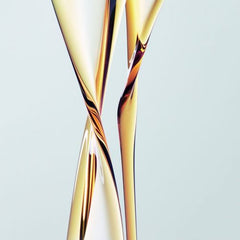
Regardless of whether your blonde is a naturally occurring phenomenon or has had a little help along the way, blondes need a special maintenance routine to keep their hair looking and feeling incredible.
Protein top-ups. Whether your hair has lightened naturally in the sun or with highlighting, UV or hair colour will break down proteins in the hair, so you want to opt for shampoos for blonde hair that replace and rebuild the structure with protein. This may be in the form of soy, quinoa, silk or rice proteins, which will support your hair.
Hydration is key. If your hair is colour-processed, the lightening process using bleach or lightening products opens the cuticle and breaks down some of the bonds in your hair called disulphide bonds. This leaves hair weaker and the outer layer of cuticle will be raised and more likely to become damaged from regular styling. This outer layer is what keeps the moisture in your hair, so to keep your blonde hair feeling supple and hydrated, using a blonde shampoo and hydrating treatments is essential. If you purely use protein-boosting shampoos, the hair can become stiff as the protein hardens and leaves the hair stronger, but it is essential that it is also getting hydration. Shampoos that contain glycerin or natural oils like caster or jojoba will leave your hair pliable and soft.
Boost the bonds in your hair. Hydration and protein will hugely benefit your hair, but new bond-repair technology will increase the links between all the bonds in your hair. Olaplex has designed its range of bond-boosting treatments to do exactly this using its key ingredient Aminopropyl Diglycol Dimaleate.
Gentle clarifying with an SLS-free shampoo. Blonde hair is particularly susceptible to discolouration and “tarnishing” from mineral deposits, air pollutants and the effects of chlorine. The reason discolouration is so noticeable is that blonde hair contains very little natural pigment, at most pale yellow, so discolouration shows up much more than on darker hair. Gently removing this build-up will allow the hair to reflect more light as well as soften the hair cuticle. Look for shampoos that contain more gentle cleansing agents such as Disodium Laureth Sulfosuccinate.
UV protection. Exposure to UV weakens the hair bonds and breaks down the melanin or colour deposits in the hair, which can not only result in damage but can change the tone of your hair. Depending on your shade of blonde, this will result in either unwanted yellow brassy tones or it will lift hair to the point of breaking. Using a shampoo for blonde hair that has UV protectors will provide valuable insurance for your blonde.
What shampoo ingredients to avoid if you are blonde
Sulphates (SLS) are used to clean dirt and oil on the hair and scalp, and to create a lather in your shampoo. However, they may cause hair to become brittle and frizzy. Sodium laureth sulphate (SLES) and sodium lauryl sulphate (SLS) are both widely used as they are inexpensive detergents and lather well, even in hard water areas. For some people, SLS and SLES can irritate the scalp and even cause eczema and affect scalp and hair health long-term. Instead, opt for mild cleansing surfactants such as sodium cocyl isethionate, cocamidopropyl betaine and sodium lauryl sulfoacetate. They may take a little more work to get a good lather, but they will not strip blonde hair or leave it compromised.
Polyethylene glycol (PEG) is used as a thickening agent in shampoo and is a derivative of petroleum. Despite its widespread use, it is believed that PEGs can be damaging to both hair and scalp. PEGs are normally listed as numbers like 120, 14M, 30 and so on.
Dimethicone is a silicone used in shampoos to add shine and make hair feel conditioned. It is cheap to mass produce and initially makes hair feel soft and adds shine. However, it builds on the hair and scalp. For blonde hair this leaves the outer cuticle coated and eventually makes it dull. Carrying out a colour treatment on hair with this coating makes it less predictable in how it will react with colour agents.
Alcohols are used in shampoos as a thickening agent, with common alcohols including propanol and isopropyl. The result is more brittleness and dehydration and potential breakage for blonde hair.




